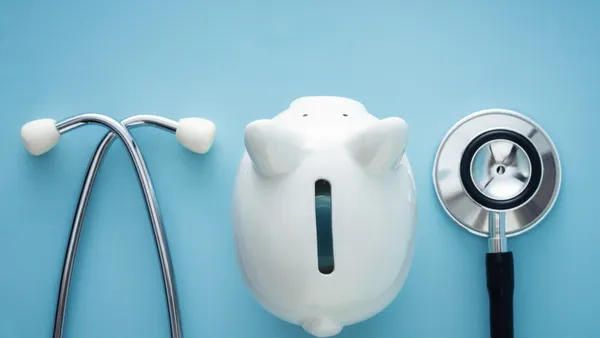Dive Brief:
- Amazon has secured a patent for a feature that would enable its voice assistant, Alexa, to detect when a user is sick and offer to purchase medicine.
- Walmart, meanwhile, was awarded a patent for a cart handle embedded with sensors that allow the company to monitor a customer's shopping experience and signal a store associate that they may need help.
- The two patents for biometric sensing devices come as both companies are ramping up their investment in healthcare.
Dive Insight:
Biometrics hold big potential in healthcare, from remote patient monitoring to patient matching. Big tech and other companies are making forays.
Apple, for example, may be planning to develop specialized chips to interpret health-related data collected by sensors in wearables and other devices, CNBC recently reported.
Amazon's patent details various ways in which Alexa would discern users' health through both their words and nonverbal clues such as sounds of stress, fatigue or even a sniffle or cough. The device would then offer a possible remedy.
"A current physical and/or emotional condition of the user may facilitate the ability to provide highly targeted audio content, such as audio advertisements or promotions, to the user," the patent states. "In FIG. 1, the voice interaction device 110 may optionally determine a follow-up inquiry of 'would you like a recipe for chicken soup?' in response to the user's utterance regarding hunger."
The healthcare implications of Walmart’s patent are less clear. It describes how its "biometric feedback cart handle" would monitor things like a customer's temperature and stress levels to determine when store assistance was possibly needed. It could also provide information on storewide trends to guide improvements in customer experience.
"For example, the server may identify that the heart rate of most customers increases when they enter certain aisles or portions of the store, when certain music is playing across the intercom, when too many customers are in a single portion of the store, or when specific store associates are nearby," the patent reads. "This data can be communicated to store management, who can take action to improve the shopping experience."
Walmart has been revving up its focus on healthcare. Earlier this year, the big-box retailer won a patent for a system that would store a person's medical information in a blockchain database and allow first responders to access the information in the case of an emergency. The company has also talked about "optimized networks" to increase consumer price and cost transparency while steering patients to providers with high performance ratings.
In July, Walmart announced it had hired Sean Slovenski, former vice president of innovation at Humana, to lead its health and wellness division.
Amazon has also been broadening its involvement in healthcare. In June, the company signed a definitive agreement to purchase online pharmacy PillPack. The move would put it in direct competition with CVS Health, which recently announced it is expanding its prescription drug delivery platform nationwide.
Amazon also recently hired renowned cardiologist Maulik Majmudar, director of Massachusetts General Hospital's Healthcare Transformation Lab, though the nature of his new role is unknown. And with partners Berkshire Hathaway and J.P. Morgan, the e-commerce giant is forming a nonprofit business to address their employees' healthcare needs.
That company is still staffing up, but already some indications of focus are beginning to emerge. Last month, the still-unnamed company retained Cambridge, Massachusetts-based consulting powerhouse Monitor Group to advise on strategies for improving care of people with chronic diseases. Harvard Medical School surgery professor and New Yorker staff writer Atul Gawande is the company's CEO.











